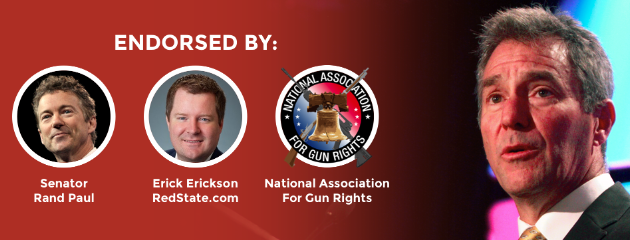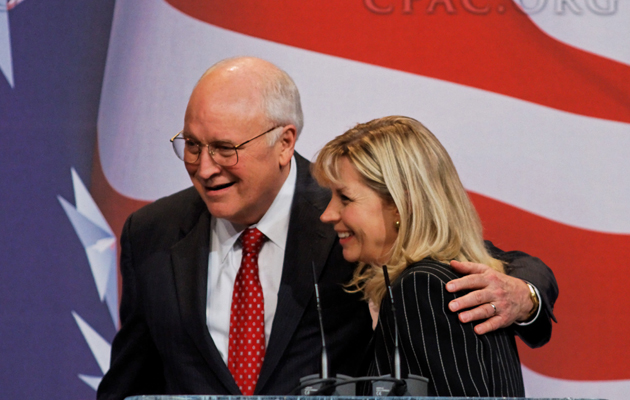
gregbrannon.com
Of all the tea partiers running for Senate in 2014, Greg Brannon, a GOP primary candidate hoping to topple vulnerable North Carolina Democrat Kay Hagan, is one of the most extreme. He opposes public education, claiming it “does nothing but dehumanize” students. He doesn’t believe that states have to follow Supreme Court decisions. He contends bipartisan compromises in Washington “enslave” Americans. He hails the the late Sen. Jesse Helms—who died in 2008 without ever renouncing his support for racial segregation—as a “modern hero.” He claims that “all ten of [Karl] Marx’s planks of Communism”—including the abolition of private property—”are law in our land today.” In October, Brannon cosponsored and spoke at a rally supporting nullification—the notion that states can invalidate federal laws at will—that was cosponsored by the League of the South, a secessionist group seeking “a free and independent Southern republic.” And Sen. Rand Paul (R-Ky.) has endorsed him.
Conservatives are eager to snatch up Hagan’s Senate seat, and they have pinned their hopes on Brannon, a tea party rabble-rouser and fiercely anti-abortion OB-GYN who has never run for elected office. In addition to Rand Paul, RedState editor Erick Erickson, who featured Brannon as a speaker at his annual RedState confab in November, and Ann Coulter have award Brannon their blessings. In a recent survey conducted by Public Policy Polling, Brannon was the only Republican who beat Hagan in a head-to-head matchup. When PPP polled Republican primary voters on the four GOP candidates, North Carolina Speaker of the House Thom Tillis ran 9 points ahead of Brannon—but nearly half of those voters said they were undecided.
Brannon says he is eager to join Sens. Mike Lee and Ted Cruz in the “wacko bird caucus.” And he has a role model in mind: Helms. He has promised, if elected, to emulate Helms, who represented the state in the Senate from 1973 to 2003. In November, Brannon told the RedState crowd that he even asked his wife to move to North Carolina because “Senator No”—Helms’s nickname—was his hero. Helms, by the way, earned that sobriquet for obstructing disability rights legislation, funding for HIV prevention, and a bill to establish a national holiday honoring Martin Luther King Jr., among many other things. He entered politics fighting interracial marriage, bullied black Senators, and considered gay people “morally sick wretches.”
Brannon is a fervent advocate of right-wing positions. He has derided public education as Marxist and he decries all things bipartisan. In November, he dismissed the role of the Supreme Court in the American system: “Just because nine people in black robes, seven of them voted that abortion is in the Constitution, it does not make that law.” The nullification rally he cosponsored and addressed was designed to make the case that nullification is “the path forward for those who love liberty”—and not only a tool that historically was used to support slavery and racial segregation.
But the issue closest to Brannon’s heart is abortion. Brannon runs a pro-life OB-GYN practice—meaning he doesn’t advise women on contraception or refer for abortions—and occasionally shows up for interviews or political events fresh off delivering a baby. In his stump speech, he alludes to the idea that the founding fathers supported fetal personhood.
In 2011, Brannon advised state Rep. Paul Stam on anti-abortion rights legislation Stam was pushing. The bill required women to wait 24 hours for an elective abortion after their initial visit to an abortion provider. Providers would have to perform a sonogram of the fetus—even if it is not medically necessary—display the image, and describe the extent of fetal development “in order for the woman to make an informed decision.” Brannon testified before a North Carolina House committee in favor of a version of the bill that would force abortion providers to give women printed materials prominently displaying this statement: “The life of each human being begins at conception.'”
In his testimony, he said patients should be informed that abortion is linked to breast cancer. The American Cancer Society, the National Cancer Institute, and the American College of Obstetricians and Gynecologists have all dismissed the notion that there is a link between breast cancer and abortion. Stam says in an email he asked Brannon to review the bill for accuracy.
The measure—without the provision compelling abortion providers to provide material asserting that human life begins at conception—became law in 2011.
Brannon serves as the medical director for Hand of Hope, a nonprofit that operates several North Carolina crisis pregnancy centers. At a recent Hand of Hope fundraiser, Brannon described the centers’ clients as “little girls [who] don’t understand what’s going on to their bodies.” He said he often presses these “little girls” to marry their boyfriends: “When I see little girls that come here, boyfriends that do show up are my favorites. Then I can whoop on them with love. How many people have we got married over the last 20 years just by riding that boy’s rear end?”
Abortion rights advocates have criticized crisis pregnancy centers for showing women graphic simulations of abortions, providing medical misinformation, and suggesting on their websites that they provide abortions. The website for Your Choice Pregnancy Clinics, which are funded by Hand of Hope, does note that these clinics do not refer women for abortions.
But the site directs women to a website and telephone hotline run by Pregnancy Decision Line. The group’s website falsely claims that morning-after pills can cause abortions and advises women not to “panic” and take a morning-after pill following unprotected sex unless she was sure ovulating. (Family planning experts advise women to take emergency contraception every time their primary birth control fails or they have unprotected sex.) The Pregnancy Decision Line suggests women visit a crisis pregnancy center before deciding whether to take a morning-after pill—without noting that many crisis pregnancy centers oppose the use of emergency contraception or mentioning that popular morning-after pills don’t work 72 hours after unprotected sex.
Brannon is the first 2014 candidate Rand Paul endorsed who isn’t an incumbent senator. In a radio interview, Brannon speculated Paul became interested in his campaign because they share an unnamed general consultant. (Brannon’s campaign manager, Reilly O’Neal, is a former Ron Paul staffer. Brannon and Paul’s offices did not respond to requests for comment for this article.) In his endorsement of Brannon, Paul said Brannon was “the clear choice for conservatives in North Carolina.”
Judging Brannon’s odds in the Republican primary, set for May, is tricky. Public Policy Polling, which has been criticized for employing dubious polling methods, is the only firm taking the race’s temperature. The most recent campaign finance filings show that Brannon has nabbed more than a quarter million dollars in contributions, mostly from individuals. That’s less than a third of what Tillis has raised—not counting the $250,000 Tillis loaned himself.
But in a four-way race with backing from national conservatives, Brannon certainly is in the hunt—and no one is more bullish on his chances than Brannon himself. “We’re getting African Americans, Hispanics, women,” Brannon bragged of his campaign in recent a radio interview. “We’re building this coalition of many.”







